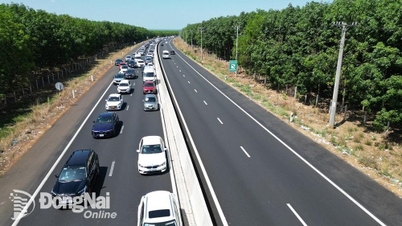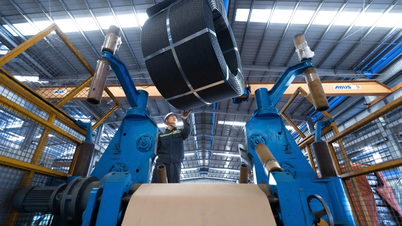According to a survey by the Private Economic Development Research Board (Board IV), up to 64% of small and medium-sized enterprises have not yet implemented any green transformation actions, while only about 5.5% of enterprises have reduced emissions in some activities and 3.8% have monitored and published emission reduction results. This figure shows that most enterprises are still in the preparation stage, not yet moving on to planning or implementing specific green solutions.
According to the survey, the reason why the green transformation process has not been accelerated is the lack of investment capital, which is the biggest challenge chosen by 50% of businesses; followed by the lack of suitable technical personnel (46%) and the lack of green technology solutions (42%). In addition, many small and medium-sized enterprises also have difficulty accessing information, technical documents and requirements from banks, making it difficult for them to meet the criteria for accessing green credit.
Mr. Phan Duc Hieu, member of the National Assembly's Economic and Financial Committee, said: "For businesses with limited capacity, to move from the current state to the digital state, they need a certain amount of resources. When we transform digitally, resources will come, but during this transformation process, policymakers believe that there should be policies to support and promote this process, creating more motivation for businesses to transform. This viewpoint is not contradictory, but complementary."

Green transformation - an inevitable trend for small and medium enterprises. Illustration photo
According to Mr. Nguyen Truong Giang, Director of the Institute of Digital Transformation Strategy, green transformation is the next stage of digital transformation. Green transformation is a revolution in the form of social organization towards sustainable development, in which data is capitalized and is the driving force.
"When we transform green, we create a new way to absorb capital. Thanks to that transformation, we attract capital to create growth resources, not that we mobilize capital for green transformation. There is a lot of capital for green transformation, but we cannot absorb it because we understand it the other way around. That is, we go looking for capital for green transformation and meet the standards." - Mr. Nguyen Truong Giang said.
According to the Institute for Policy and Strategy Research, the lack of a criteria framework, lack of specific guidance, overlap between ministries and sectors and fragmented support policies make businesses confused, not knowing how much they have to do to be “qualified”, becoming an “obstacle” for businesses, especially small and medium enterprises. Green transformation cannot be a solitary game for businesses. It requires close coordination between the State, the private sector, financial institutions, research institutes and the social community.
Dr. Nguyen Quoc Viet, Lecturer at the University of Economics - Vietnam National University, Hanoi, said: "Our policies need to be put into practice, into the breath of businesses, from production to responsible consumption. Because our money is limited, we need to focus, focus on key points, not spread out. If we spread out, each department will be like a potato, each locality will be like a holy land, each unit will be a small part of policy support and policy practice. Therefore, we need more policy synchronization."
Mr. Nguyen Minh Khoi - Program Director of the Tony Blair Institute said that Vietnam needs a systematic approach, with "tailored" policies suitable to the realities of domestic enterprises. It is necessary to standardize the product traceability system, by applying blockchain technology and electronic identification.
Support green innovation startups. This is a pioneering, flexible force capable of creating breakthroughs in the fields of renewable energy, waste treatment, circular production or sustainable agriculture. For businesses, digital transformation should not be considered a “technological task”, but should be viewed as a comprehensive strategy, laying the foundation for green and sustainable development. Digital transformation is not only a necessary condition, but also a sufficient condition for businesses to make a real green transformation.
Mr. Nguyen Minh Khoi commented: "I propose to build a national green credit guarantee fund. Indonesia's experience is worth learning and referring to. Second, review the categories to exempt and reduce green technology import tax. Input is a very important factor. We have had a list of 54 environmentally friendly goods under the cooperation agreement with APEC since 2012, but the standards and number of categories of goods for importing green technology can be expanded and need to be reviewed so that more and more green technology can access Vietnam and businesses have technology resources to better support their green conversion products."
According to experts' analysis, in order for the green transformation of enterprises to take place effectively and substantially, it is necessary to urgently implement the National Strategy on Green Growth. In particular, credit institutions increase lending capital for innovative enterprises, support small and medium enterprises in green transformation. Ministries, branches and localities need to enhance the effectiveness of the local support fund, support loan guarantees for enterprises.
On the business side, it is necessary to proactively practice green governance, aiming to create products that have an impact on society as well as the environment. Small and medium enterprises need to proactively access green credit sources from domestic and international financial institutions. Business leaders also need to flexibly innovate their thinking, proactively seeking green financial sources in the market.
Source: https://baolaocai.vn/chuyen-doi-xanh-xu-the-tat-yeu-cua-doanh-nghiep-nho-va-vua-post401176.html







![[Photo] Vietnam shines at Paris International Fair 2025 with cultural and culinary colors](https://vphoto.vietnam.vn/thumb/1200x675/vietnam/resource/IMAGE/2025/5/4/74b16c2a197a42eb97597414009d4eb8)
















































































![[Video]. Building OCOP products based on local strengths](https://vphoto.vietnam.vn/thumb/402x226/vietnam/resource/IMAGE/2025/5/3/61677e8b3a364110b271e7b15ed91b3f)



Comment (0)